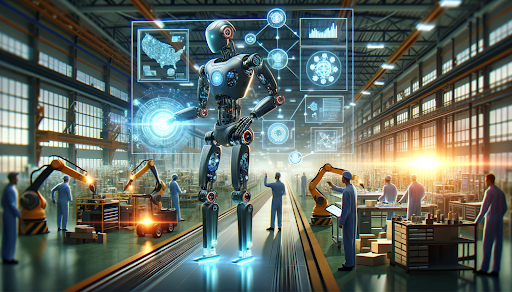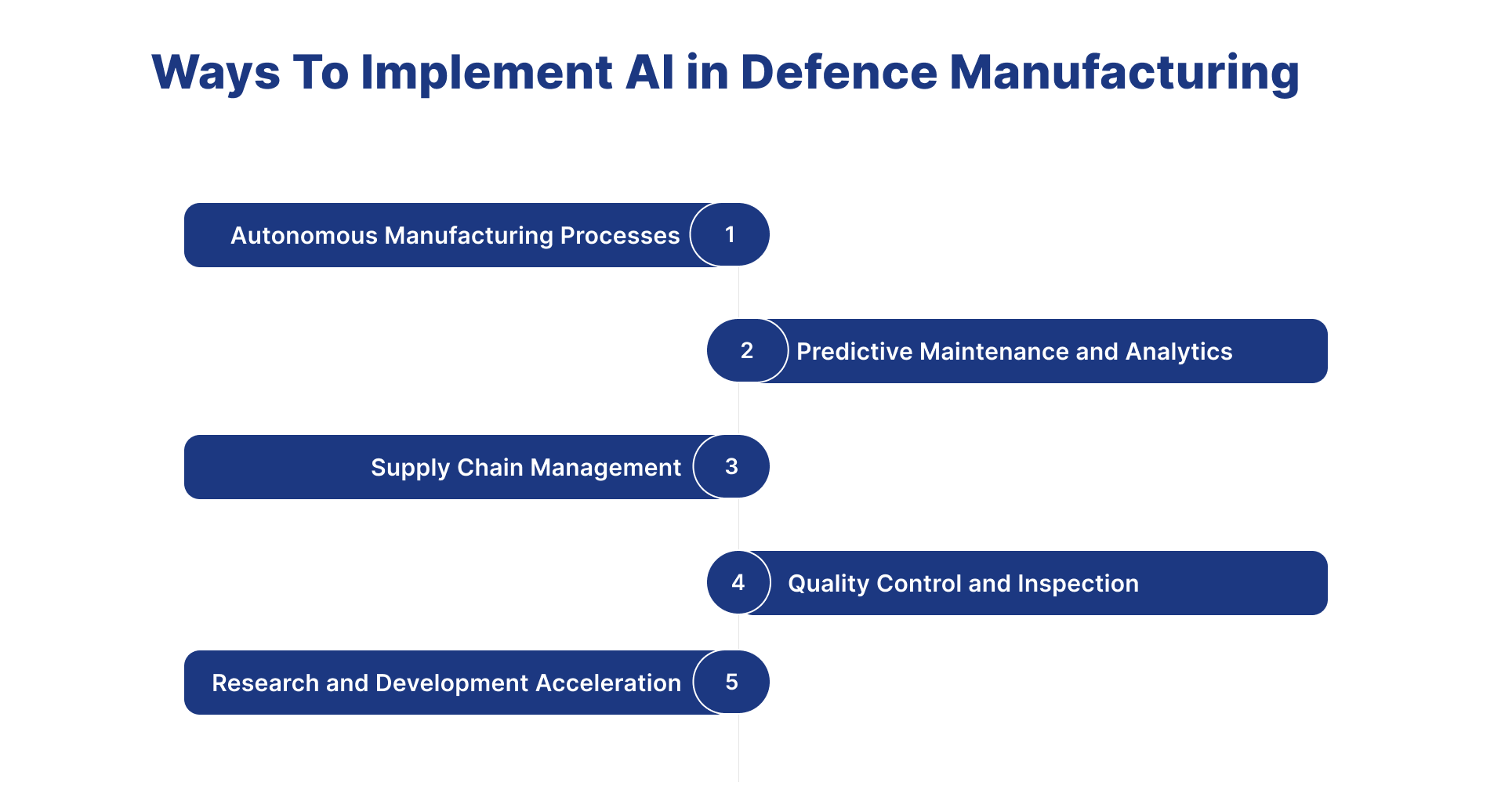AI In Defence Manufacturing:5 Ways To Implement AI to Transform The Defence Manufacturing Industry
AI in defence manufacturing has the potential to transform defence production by providing several benefits, such as higher automation, improved efficiency.
Introduction
- The defence manufacturing industry contributes significantly to national security by developing modern armament systems, vehicles, and equipment. Defence manufacturing is entering a new transition phase as technology advances, particularly Artificial Intelligence (AI). AI in defence manufacturing has the potential to transform defence production by providing several benefits, such as higher automation, improved efficiency, increased accuracy, and cost reductions. Defence organizations may optimize production lines, eliminate human error, and meet the growing needs of contemporary combat by introducing AI into many phases of the manufacturing process, including design, production, quality control, and maintenance.

- This article investigates the possible uses of artificial intelligence AI in defence manufacturing and considers the benefits and problems connected with its adoption. AI-driven solutions can change defence production, eventually improving national defence capabilities, from autonomous robots on the assembly line to predictive maintenance systems and data-driven supply chain management. In this post, we will look at how to implement AI in defence manufacturing.
Ways To Implement AI in Defence Manufacturing

1.Autonomous Manufacturing Processes:
-
Traditional manufacturing processes faced significant complexity and operational efficiency difficulties. Human-operated machinery and manual labor were the backbones of defence manufacture, resulting in inherent accuracy, speed, and adaptability limits. Using human operators added the possibility of mistakes, resulting in inconsistencies and inefficiencies in complex activities.
-
The use of AI in defence manufacturing processes solves the constraints of human-operated technology. Autonomous systems, guided by machine learning capabilities, deliver remarkable precision to complex operations, reducing errors associated with manual labour. This change leads to a manufacturing environment marked by increased efficiency and a significant decrease in the margin of error
2.Predictive Maintenance and Analytics:
-
Traditional techniques for maintenance in defence production were reactive, relying on planned interventions or responding to equipment breakdowns. Inadequate real-time visibility into machinery health frequently resulted in unanticipated downtimes, higher operating expenses, and lower overall equipment effectiveness. While earlier maintenance regimens were necessary, they frequently resulted in unneeded preventative interventions and cost inefficiencies.
-
AI-powered analytics give valuable insights into machinery performance patterns. Manufacturers may detect patterns, optimize maintenance schedules, and improve operational efficiency by analyzing historical data. This data-driven decision-making, a hallmark of AI-driven analytics, elevates maintenance from a reactive cost center to a strategic asset that adds to the overall efficiency of defence manufacturing operations. In this way, the defence industry can use AI in defence manufacturing.
3.supply chain management:
-
Traditional supply chain management issues in defence manufacturing included forecasting accuracy, inventory optimization, and efficient identification of potential bottlenecks. The dependence on human data analysis and historical models frequently led to inadequate inventory levels, material procurement delays, and difficulty responding quickly to changing production demands. Siloed procedures in the supply chain resulted in inefficiencies and raised the risk of disruption.
-
Predictive analytics becomes a cornerstone of supply chain management using AI. Large datasets are analysed by machine learning algorithms, which consider aspects such as past demand, market trends, and production schedules. This allows for more precise demand forecasting, reducing the risk of stockouts or surplus inventories. In this way, the defence industry can use AI in defence manufacturing.
4.Quality Control and Inspection :
- Traditional quality control and inspection methods in defence production depended mainly on manual inspections, rendering them vulnerable to human mistakes and supervision. The constraints of human operators in continuously recognizing errors or abnormalities in complicated defence equipment sometimes result in differences in product quality. The reliance on human inspection techniques also presented scalability, speed, and complete analysis issues, especially as manufacturing numbers rose.

- Image identification and machine learning algorithms driven by AI are now the foundation of quality control. These technologies provide unrivalled precision in detecting faults, abnormalities, or departures from specifications. Automated inspections guarantee that every component is thoroughly examined more uniformly and accurately than previous human procedures. In this way, the defence industry can use AI in defence manufacturing.
5.Research and Development Acceleration:
-
Traditional R&D cycles in defence production were distinguished by time-consuming procedures frequently confined by human capabilities and conventional testing techniques. The reliance on manual simulations and iterative testing resulted in longer prototyping and technology introduction timelines. This slow-paced strategy hampered the capacity to adapt quickly to new defence demands and capitalize on technological advances.
-
AI-powered analytics and simulations are now the foundation of R&D acceleration. Machine learning models have unparalleled speed and accuracy in analysing large datasets, simulating multiple situations, and predicting future outcomes. This allows defence producers to investigate a wide range of alternatives swiftly, expediting the prototype process and shortening the time necessary to bring innovative technologies to life. In this way, the defence industry can use AI in defense manufacturing.
Conclusion
- In conclusion, using AI in defence manufacturing has enormous potential for boosting operational efficiency and strengthening national defence capabilities. Defence organisations may expedite production processes, decrease costs, and shorten development cycles for modern armament systems and equipment by incorporating AI technologies such as automation, machine learning, and predictive analytics. AI-powered technologies, such as autonomous assembly line robots and data-driven supply chain management, have the potential to enhance production results and overall logistics drastically.
How Digiqt will help you to adapt AI in your company
-
At Digiqt, we are dedicated to assisting companies in automating critical processes. Our highly skilled and professional team ensures the timely development and delivery of AI software. We commence by thoroughly understanding our client's specific requirements, and based on these requirements, our proficient team develops the AI software. Furthermore, we provide our clients monthly updates on the software development progress.
-
Digiqt's commitment to automation, client-centric software development, and regular updates ensures efficiency and effectiveness in streamlining insurance operations.
Contact Us
Frequently Asked Questions
What are AI In Defence Manufacturing?
AI In Defence Manufacturing are AI-powered systems that automate and optimize processes using machine learning, natural language processing, and intelligent decision-making capabilities.
How do AI In Defence Manufacturing work?
AI In Defence Manufacturing work by analyzing data, learning patterns, and executing tasks autonomously while integrating with existing systems to streamline operations and improve efficiency.
What are the benefits of using AI In Defence Manufacturing?
The benefits include increased efficiency, reduced operational costs, improved accuracy, 24/7 availability, better customer experience, and data-driven insights for decision-making.


















